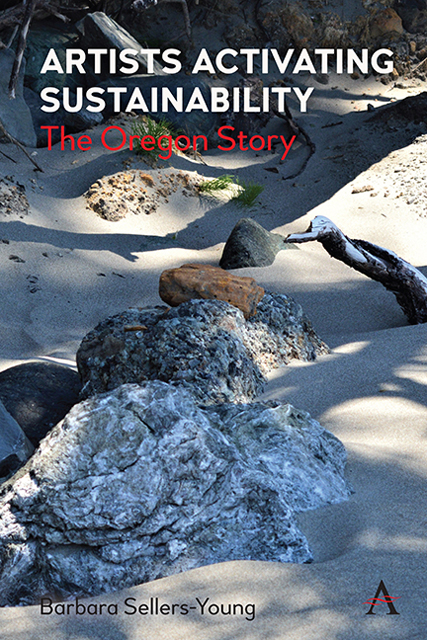Book contents
- Frontmatter
- Dedication
- Contents
- Acknowledgments
- List of Figures
- Introduction: Art, Environment and Metaphor
- 1 Environmental Activism, Arts and the Land of Eden Landscape One: High Desert Basin and Range
- Landscape One High Desert Basin and Range
- Landscape Two Columbia Gorge and Plateau
- Landscape Three Cascade Range
- Landscape Four The Willamette Valley
- Landscape Five Rogue River Valley
- Landscape Six Oregon Coast and Coast Range
- Index
Introduction: Art, Environment and Metaphor
Published online by Cambridge University Press: 10 January 2023
- Frontmatter
- Dedication
- Contents
- Acknowledgments
- List of Figures
- Introduction: Art, Environment and Metaphor
- 1 Environmental Activism, Arts and the Land of Eden Landscape One: High Desert Basin and Range
- Landscape One High Desert Basin and Range
- Landscape Two Columbia Gorge and Plateau
- Landscape Three Cascade Range
- Landscape Four The Willamette Valley
- Landscape Five Rogue River Valley
- Landscape Six Oregon Coast and Coast Range
- Index
Summary
The sixth of February, 2020, brought a convoy of trucks driving through the streets of Salem and around Oregon's capital building honking their horns as an indication of their presence. They were organized by a group called Timber Unity that represents Oregonians who work the land as foresters, loggers, ranchers, truckers, miners, fishermen and farmers. They and their representatives were in opposition to the proposed cap-and-trade climate legislation that they believed would negatively impact their livelihoods. Their protest represented a cultural divide between the increasingly population dense areas of the cities along the Interstate 5 (I-5) corridor from Portland to Eugene and the rural less populated landmass of Oregon from the small towns along the Pacific coast to the river valleys of southern Oregon to the Cascade Range of central Oregon and the high desert and range land of eastern Oregon. Each honk of a truck was a reminder of Oregon's history as a resource-based economy from the time that the Indigenous groups settled the land 15,000 plus years ago through the arrival of fur traders and settlers in the eighteenth and nineteenth centuries.
The following September on Labor Day weekend of 2020 a wind storm swept through Oregon's drought-ridden forests along the western Cascade Range downing trees and power lines and setting off the worst set of fires in the Oregon's history. The fires killed at least 10 people, burned more than 1,000,000 acres and destroyed hundreds of homes. Major population centers along the I-5 corridor from the suburbs of Portland to Salem and Eugene were threatened. The cities of Talent and Phoenix in southern Oregon were destroyed as well as towns along the Santiam Highway between Salem and Bend. Hazardous smoke was in the air for two weeks and people were cautioned to stay indoors. When the rain returned, the residue from the fires cascaded down the hills and mountains creating long-term problems for drinking water, and the denuded hillsides were at a risk for landslides. Scientists commenting on the situation suggested that in an era of global warming fires should not have come as a surprise.
The forest fires of September 2020 reignited the battle lines that have been the history of Oregon's decades-long environmental debate.
- Type
- Chapter
- Information
- Artists Activating SustainabilityThe Oregon Story, pp. 1 - 20Publisher: Anthem PressPrint publication year: 2022

